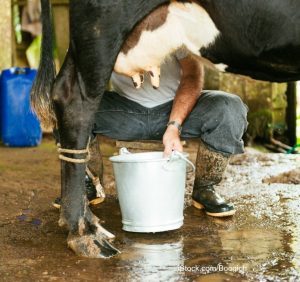September is Food Safety Month, a good time for debunking food myths. There are a lot of myths about raw milk on the Internet, some of them mislead people into thinking that raw milk is a safe health food that can cure illnesses. It’s not.
 Before we get to why, it’s important to note that between 60 and 75 percent of adults worldwide are lactose intolerant, meaning they are physically unable to digest lactose, the main sugar in milk. Most of us lose this ability by the time we start school. But many of us don’t stop drinking milk when we reach school age. Symptoms of lactose intolerance include bloating, gas, abdominal cramping, diarrhea, nausea and vomiting.
Before we get to why, it’s important to note that between 60 and 75 percent of adults worldwide are lactose intolerant, meaning they are physically unable to digest lactose, the main sugar in milk. Most of us lose this ability by the time we start school. But many of us don’t stop drinking milk when we reach school age. Symptoms of lactose intolerance include bloating, gas, abdominal cramping, diarrhea, nausea and vomiting.
Lactose intolerance is not the same a milk allergy. About 2.5 percent of Americans have milk allergies meaning the have a dramatic immune response to one or both of the proteins found in milk, whey and casein. Symptoms of a milk allergy appear immediately after drinking milk or eating a product made from milk. They include hives, wheezing and vomiting, Other symptoms that develop include diarrhea, abdominal cramps, coughing, wheezing, runny nose, watery eyes and itchy skin.
Whether its pasteurized or raw, milk contains lactose, casein and whey. If you are allergic or lactose intolerant to pasteurized milk, you will also be allergic or lactose intolerant to raw milk. A recent study by nutritionists at Stanford University confirms this science.
Those who have trouble digesting milk should not despair. Because most people can’t digest milk there are plenty of examples of dairy-free diets around the globe with centuries-long track records of delivering calcium and Vitamin D from other sources. A study from the Harvard School of Public Health shows that milk is not the only or best source of calcium.
Now for the myths.
Myth No. 1 If you know the farmer, the milk is safe. False. Knowing the farmer who grows some of the food you eat or milk you drink is nice but it does not mean the raw milk he or she sells is safe. How could it? Food Poisoning Bulletin has covered lots of raw milk outbreaks and lots of the people who got sick or whose children got sick knew the farmer.
Myth No. 2 Milk from grass-fed cows does not harbor pathogens. False. Organic and grass-fed cows have been the source of raw milk outbreaks and E.coli outbreaks linked to beef.
Myth No. 3 Raw milk has the ability to kill off pathogens. False. If this were true, everybody under the sun would be trying to harness the power of that key ingredient and put it use in all of our food. And there wouldn’t be raw milk outbreaks. But every year there are food poisoning outbreaks linked to raw milk that was contaminated with Campylobacter, E.coli or other pathogens.
These myths are often accompanied by claims that raw milk can sure asthma, allergies and ADD. There is no scientific evidence to support these claims. There is only anecdotal evidence.
Similarly, there are people who say they drink it all the time and haven’t gotten sick. This is not evidence of raw milk’s safety. Pathogens are not evenly distributed in raw milk and it only takes a small number of them to make someone sick. In addition, one of the most dangerous strains of E.coli, E.coli O157:H7, is a relative newcomer to the scene, making its outbreak debut in 1982.
Currently, there are four children in Kentucky hospitalized with hemolytic uremic syndrome (HUS) a condition that develops in some E.coli cases that causes kidney failure, seizure, stroke, coma and death. The youngest patient is an 18-month old who has been receiving dialysis.
The Centers for Disease Control and Prevention (CDC) considers raw milk a high-risk food and an ongoing public health threat. Because children are at high risk for developing HUS and other serious complications of food poisoning, the American Academy of Pediatrics wants raw milk sales banned. They are joined by a host of medical, scientific and public health organizations including the U.S. Food and Drug Administration (FDA), the Centers for Disease Control and Prevention (CDC), the American Medical Association, the American Veterinary Medical Association, the International Association for Food Protection, the National Environmental Health Association, and the World Health Association in endorsing the consumption of pasteurized milk and milk products only for pregnant women, infants, and children.




